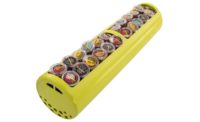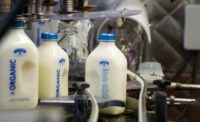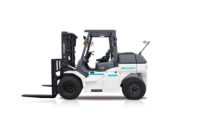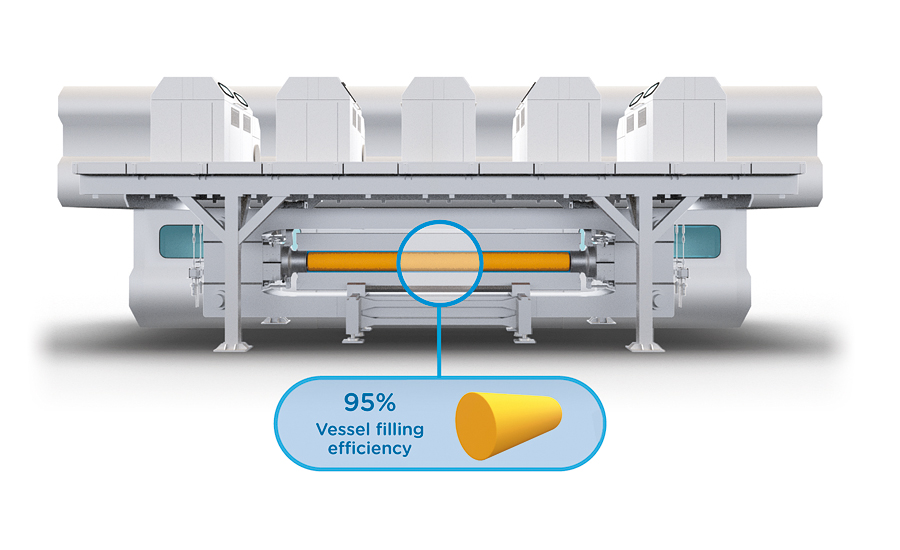The future of high-pressure processing
The widespread application of HPP continues to boost the development and demand for new product development and equipment.

When Universal Pasteurization Co. re-branded as Universal Pure, it expects to drive double-digit growth company-wide, specifically at its Malvern, Pa., location, as seen here.

The Hiperbaric 1050 Bulk is designed for large productions of HPP beverages that are processed in bulk before bottling.

JBT/Avure Technologies foresees growth in ready meals/refrigerated meals, baby food, salad dressings, pet food, dairy products and soups.

NEXT HPP and CHEP co-developed an asset tracking and temperature monitoring system that works in conjunction with NEXT HPP’s basket and pallet solution.

Lineage Logistics anticipates a rapid expansion of HPP into private label brands and in the foodservice industry.

Multivac’s HPP partner, Uhde High Pressure Technologies, manufactures HPP machines in a number of different sizes—55L, 160L, 350L and the Tandem 700L system.






It used to be that high-pressure processing (HPP) was the ideal food safety and expanded shelf-life solution for refrigerated dips and spreads, deli meats and chilled beverages. However, the projected $10 billion market has been gradually expanding into more non-traditional categories such as baby food.
“Parents are looking for less processed, fresher, preservative-free options for their kids, as opposed to what’s historically been available,” says Sarah Segel, marketing and business development manager for American Pasteurization Co., LLC, Wauwatosa, Wis. “HPP destroys bacteria that can make young people in particular very sick, while significantly extending shelf life and maintaining the nutritional profile, taste and goodness of the fresh product.”
HPP has also become more popular with ready-to-heat food products, such as family meals, adds Segel.
“We think that as families look to serve healthier, freshly made meals, but don’t have the time to cook from scratch, that this category will continue to grow,” she says.
For its part, JBT/Avure Technologies, Erlanger, Ky., is experiencing growth in all segments of refrigerated foods and beverages.
“Applications that are expanding currently include ready meals/refrigerated meals, baby food, salad dressings, pet food, dairy products and soups,” says Lisa Wessels, chief marketing officer. “In addition, we are seeing much growth in what we refer to as tolling operations, or contract packagers for HPP. More and more companies are opening tolling centers all over the world.”
Additionally, many restaurant chains have been investing in clean label products, according to Christopher Timmer, senior vice president, sales and value-added services for Lineage Logistics, LLC, a Colton, Calif.-based warehousing and logistics company sponsored by Bay Grove Capital LLC, San Francisco.
“From our perspective, we anticipate a rapid expansion of HPP into private label brands, as retailers try to keep pace with the national brands and meet consumer demand for healthier products,” says Timmer. “We also see HPP continuing to grow within the foodservice industry, especially in the quick-serve sector, in an effort to reduce risk at the operator level.”
HPP will continue to change how foods and beverages are made in production environments and how they’re presented at the point of purchase, according to Mark Duffy, chief executive officer of Universal Pure, Lincoln, Neb., formerly known as Universal Pasteurization Co.
“From a production standpoint, companies are becoming ever more familiar with how HPP can improve the safety and quality of their products. HPP will also be increasingly noticeable in how products are presented to consumers. This could include the packaging and messaging refrigerated food and beverage manufacturers are using to support the HPP process and related benefits. Many brands are also starting or planning to explain their use of high-pressure processing in the descriptions and language found on their labels. The HPP process itself will continue to evolve and expand, as innovative companies utilize the technology’s benefits on different types of foods and beverages,” says Duffy.
That’s why the Illinois Institute of Technology’s Institute for Food Safety and Health (IFSH), Chicago, collaborated with ConnectFood.com, Chicago; Chicagoland Food & Beverage Network, Chicago; and All Natural Freshness, Bloomfield Hills, Mich., to build the Food Processing Center of Excellence with a focus on HPP technology. The HPP Center of Excellence makes available new resources that educate, elevate and communicate best practices for the global food manufacturing industry.
And, PMMI, The Association for Packaging and Processing Technologies, and the Reston, Va.-based owner of the PACK EXPO tradeshows, formed the HPP Council, designed to address questions about HPP technology, develop and formalize industry best practices and promote networking among professionals using HPP.
“What you are seeing in the market is dramatic growth of companies that are using HPP vs. that of companies that are using alternative pasteurization methods such as heat and chemicals,” says Tim Cox, vice president, Liberty Cold, Bolingbrook, Ill.
HPP technologies pave the way for expansion
Outside of new product development, the HPP market continues to grow thanks to the introduction of state-of-the-art equipment.
The Hiperbaric 1050 Bulk from Hiperbaric USA, Miami, Fla., for example, is designed for large production of HPP beverages, says Jaime Nicolas-Correa, director.

The Hiperbaric 1050 Bulk is designed for large productions of HPP beverages that are processed in bulk before bottling. Photos courtesy of Hiperbaric USA.
Based on a patent-pending revolutionary concept, in which beverages are processed in bulk before bottling, the Hiperbaric 1050 Bulk delivers 10,000 liters an hour, what is said to be the world’s largest productivity. The Hiperbaric 1050 Bulk can retrofit into any large beverage production line, and allows the use of any kind of packaging after HPP, regardless the material, design or size.
Meanwhile, Cornell University’s College of Agriculture and Life Sciences, Ithaca, N.Y., is said to be the nation’s first commercial scale validation facility for HPP with the installation of the Hiperbaric 55 high-pressure food processor. Cornell’s New York State Agricultural Experiment Station in Geneva, N.Y., maintains the ability to retain fresh quality attributes in food while inactivating spoilage and pathogenic microorganisms.
Hiperbaric’s HPP equipment is also said to be the first in the United States to be installed within a Biohazard Level 2 facility, which means researchers can introduce pathogens to foods and test how well the pressure system kills them.
Meanwhile, Multivac’s HPP partner, Uhde High Pressure Technologies, Germany, manufactures HPP machines in a number of different sizes—55L, 160L, 350L and the Tandem 700L system, which combines two 350L HPP plants with common controls, hydraulics and pressure-building intensifiers to achieve what is dubbed as the most efficient system on the market today.
“Though Uhde is the manufacturer, Multivac’s team of high-pressure processing experts innovated the patented staged-decompression process, which enables the processing of modified atmosphere packaging,” says Cem Yildirim, market development sales manager of Multivac Inc., Kansas City, Mo. “The trend toward clean labels, minimizing food waste and more nutritious foods only fuels the prospects for HPP moving forward.”
For its part, NEXT HPP, White Pigeon, Mich., teamed up with CHEP, Alpharetta, Ga., to develop an asset tracking and temperature monitoring system that works in conjunction with NEXT HPP’s basket and pallet solution. How it works is, the solution scans the product’s barcode and lot ID, then scans the HPP basket and pallet. All data is sent to a secure internet cloud where violations are automatically generated and exception alerts sent out to designated individuals, thus eliminating manual data collection and manual violations errors.
“At NEXT HPP, we make the equipment that allows for effective and efficient movement and tracking of HPP product through the entire supply chain,” says Gerald Ludwick, general manager. “This ensures that product is FSMA compliant with automated HACCP and data collection built in. Our solutions target in having HPP be part of an efficient factory, not the reason for it.”
Go to http://bit.ly/1L8ZurQ to learn more about these and other HPP technologies.
Looking for a reprint of this article?
From high-res PDFs to custom plaques, order your copy today!












